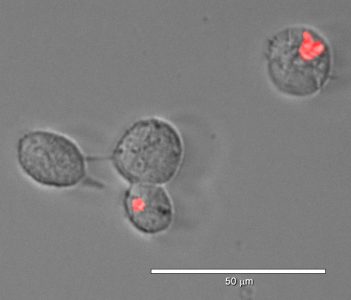
Mabs infecting THP-1 cells. Courtesy of Adrian Richter.
Mycobacterium abscessus (Mabs) is a nontuberculous mycobacteria (NTM) that causes severe disease in patients with cystic fibrosis (CF) and other underlying lung diseases. This environmental bacterium is ubiquitously present in tap water, and can infect immunodeficient patients and cause nosocomial outbreaks. Chronic Mabs infection in CF patients is associated with declining lung function, adds challenges to lung transplantation, and contributes to fatal airway damage with mortality rates as high as 60%.
To complicate things, Mabs is the most pathogenic and chemotherapy-resistant rapid-growing mycobacterium. Antibiotics against replicating bacteria are relatively ineffective as Mabs form mature biofilms in which they exist in a stationary-phase state. Frequently used drugs that are effective against Mtb and other NTM infections are also relatively inactive when confronted with Mabs. As such, treatment with antibiotics alone commonly fails in the clinical setting, relapses are frequent, and disease may require invasive techniques like surgical resection.
There is an urgent need for new antibiotics to treats Mabs infection. As Mabs is genetically similar to Mtb and share various mechanisms responsible for natural resistance to drugs, we are able to apply Mtb-specific molecular biology methods and approaches to Mabs research. We are developing novel high-throughput and high-content screening assays that will emulate biologically relevant CF conditions (i) intracellularly in the macrophage, and (ii) in biofilm-like growth within the lung. Our goal is to screen multiple chemical and natural product libraries to identify new and effective drug candidates in order to accelerate crucial drug discovery against this notorious CF pathogen.